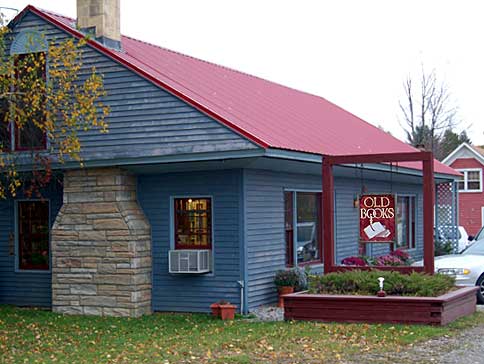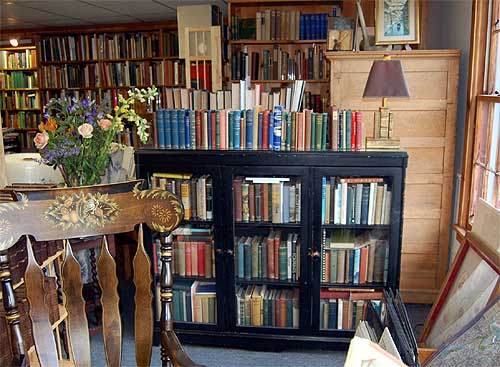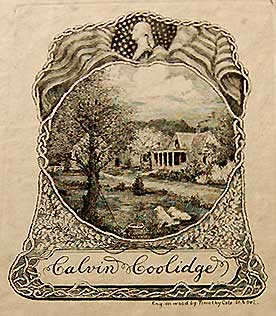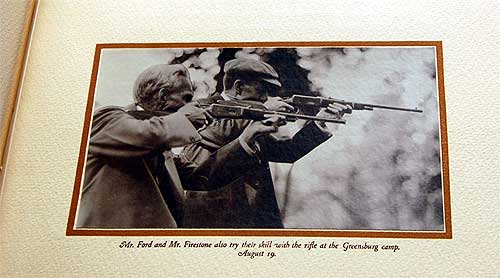THE JOYS OF AMERICANA
Tom: I notice you have a deep inventory of Americana and American history. I gather that reflects your own interests?
Gary: I got into the book business because I was bitten as a collector when I was young. When I was a kid I was very much enamored with the American West, the Indians, the Indian Wars, and I collected books by and about General Custer. My mother frequented the branch library near our home in Syracuse, New York. She would go at once a week, often twice and she would bring home a stack of books. She was a very well-read woman. And so I would go with her, I would bring back books, and I would read them. It whetted my appetite for more. For anyone who reads this and wants to engender their children with a sense of history, this is a sure-fire method: she would encourage me by taking me to some of the places, that were practical in terms of geography, that I was interested in and that I had been reading about. If I read a book about the Revolutionary War and there was a site nearby, in Massachusetts or whatever, she would take me to it and it came to life for me, which made me want to read more and learn more.It paid off in school as well.
Tom: Do you still collect books?
Gary: Yes. But Theodore Roosevelt has supplanted Custer.
Tom: I see you have a lot of Teddy Roosevelt material here.
Gary: Yes, I always have a section of T.R. books, and am always buying them. Plus, I just got an immaculate set of his Complete Works, the Statesman Edition, 20 volumes. In the other room I have one of the scarcest of all T.R. sets, the Gebbie edition, it is the basis for the Elkhorn Edition, my favorite, that came later.
T: So there's great interest in him?
G: God, yes. Every politician seems to want to reflect him in terms of his character and honesty, whether they are running for President or Governor or whatever. This weekend in Boston is the National Theodore Roosevelt Association meeting, of which I am a proud member. The T.R. Association operates T.R.´s childhood home in New York City plus his estate at Sagamore Hill, and they also have a hand in running the inaugural site in Buffalo. And they may have something to do with the site in Medora where his Elkhorn ranch was. There's a great interest in T.R.. Always will be. He's a captivating individual.
T: My general sense is that people are more interested in the colonial period and the time up through the civil war. I get a feeling there's more interest in that period than post-civil war. Maybe I'm wrong.
G: It's funny, I never was interested much in the post-civil war period, up til the Indian Wars period. I was collecting the Indian Wars. It was Trans-Mississippi West, 1860-1890, no Texas, no California. So it was high plains and Indian Wars and that stuff. I wasn't interested in the rise of big business, I wasn't interested in the rise of the labor movement, I wasn't interested in the Gilded Age. But I've since become very interested in those times, because that was the age that T.R. grew up in, and it was the age of reform. So I've spent a lot of time reading about it now. That's the thing about American History, there is no uninteresting period in American History.
[Gary proceeded to discourse at length on Thurlow Weed (1797-1882), a nearly forgotten New York Assemblyman who was one of the most important political figures of his time.]
Reading about these people is fascinating. Our history is a remarkable history. And I used to be so staid. I was interested in the Revolution, the French and Indian War, but I couldn't have been less interested in the War of 1812, I got a little bit interested in Jackson...but you can take any three-year period and look at it closely and you'll be absolutely amazed. And that's why I like selling books on history.
T: Tell me about some of your greatest finds.
G: One of the most enjoyable books and best books we ever sold was a gold rush guide. Bill Hutchison and I bought a copy of a Pratte & Hunt's Guide to Gold Mines of Kansas. Ever hear of the Kansas Gold Rush? The Kansas Gold Rush was really the Pike's Peak Gold Rush. So, we bought this gold rush guide and it had the map in it, but we thought the map might have been trimmed. The beauty of it was that it was obviously a really scarce piece. In my reference books I happened to own the bibliography to these guides. In fact, I owned the author's copy, which had been annotated in terms of changes and where copies of various gold rush guides were located. We used that and we used OCLC (Online Computer Library Center) to locate all the existing copies. We determined that many Universities had this book, so we started contacting them and asking them if they really had it or if it was a microfiche. By contacting all of them we learned that actually only two of them had the book...all the other listings were facsimiles or microfiche copies. Our guide was really quite scarce.
Perhaps the most satisfying thing about this experience was how we priced and sold it -- We were also able to prove that the map was not trimmed, so our copy was as issued. There were however a great shortage of comparables. No copies listed elsewhere, no recent auction records. So we used the Streeter copy auction record and we were then able to extrapolate a value for it based on the appreciation of similar guides also from the Streeter sale and adjust for rarity and condition. We arrived at a price that was realistic and attractive, and it sold. We sold it to another dealer who specializes in that kind of material. It was a good book but it still needed to be promoted, not just thrown in a case and ignored, waiting for someone to salute.
[Gary pulled another book from a pile of books on a nearby table.]
Gary: Here's a very interesting book I sold this morning. I'll never see another one. Someone compiled 238 broadside song sheets from the Civil War from two different publishers.
Tom: So it's one of a kind.
G: Yes, it's a great thing. It was bound in the 1880s. Not only that, there are three Lincoln Assassination songs in it. Also the Emancipation Proclamation song is in here. And a wonderful song about General Lee going to Pennsylvania to get clothes at the tailor shops.
[Gary then showed me several books he had bought at auction the night before. One of them was a valuable 1855 book about Central Park -- Reminiscences of the Park. Another was a book about the natural history of New York State along the Erie Canal, Letters on the Natural History and Internal Resources of the State of New York, by Hibernicus. (Hibernicus was the pseudonym of DeWitt Clinton, who, as governor of New York, was responsible for the Canal's construction).]
Gary: Oh, and there's a great book right there. This is the only copy of this book currently available in the on-line world. Our Vacation Days of 1918. Henry Ford, Thomas Edison, Harvey Firestone vacationed together several times. Here is the record of their last trip with John Burroughs. Burroughs wrote the text. They had it published after his death as a tribute.
[Gary handed me a very unique book of tipped-on photographs. The sepia photographs illustrated the recreational activities – Henry Ford, Thomas Edison, Harvey Firestone, all traveling together.]
Gary: The text of this book was reprinted posthumously in 1921, as a chapter in Burroughs' last book. What I like best about this copy is that it belonged to President Calvin Coolidge and it bears his lovely bookplate. Henry Ford almost challenged Coolidge for the Presidency, but his anti-semitic background harpooned his opportunity. There is a great photograph of Ford and Coolidge, and I think Edison sitting on the front porch of the Coolidge house in Vermont, where he told Calvin that he wasn't going to run against him.
T: This was President Calvin Coolidge's copy! This is so great. How did you get hold of this?
G: Cal called. (laughs)
T: You could actually reprint this book yourself. Do you ever think of doing that, reprinting a scarce book?
G: No. There's only one I've ever thought of reprinting. I own a line-a-day diary, it's a trip by three young Harvard mates of TR's son, Archie. They travel to the Grand Canyon in 1918 for a summer of sport, and they actually hook up with Theodore Roosevelt and go cougar hunting. The diary was compiled from their individual diaries at the end of the trip. Each one recorded the day's activities. It is interesting to see the three versions of each day side by side. A Rashomon view. [MORE]




